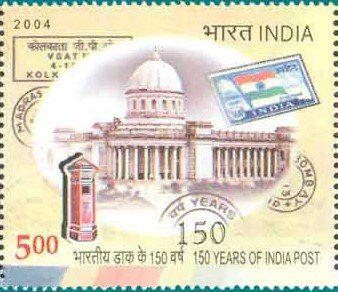Culcutta G.P.O. First Postage Stamp of Independent India

Technical Data
| Date of Issue | October 4, 2004 |
|---|---|
| Denomination | Rs. 5 |
| Quantity | 800,000 |
| Perforation | comb 14 x 13½ |
| Printer | Security Printing Press, Nashik |
| Watermark | No Watermark |
| Colors | Multicolor |
| Catalog Codes |
Michel IN 2047 Stamp Number IN 2078c Yvert et Tellier IN 1812 Stanley Gibbons IN 2226 WADP Numbering System - WNS IN033.04 |
| Themes | Anniversaries and Jubilees | Buildings | Mailboxes | Post Offices | Postal History | Postal Services | Stamps |
Table of Contents
150 Years of India Post: Celebrating the Culcutta G.P.O. and the First Postage Stamp of Independent India
As part of the rich history of India Post, two significant milestones that hold great historical and cultural importance are the Calcutta General Post Office (G.P.O.) and the First Postage Stamp of Independent India.
1. Calcutta General Post Office (G.P.O.)
Established:
The Calcutta G.P.O. is one of the oldest and most iconic post offices in India, established in 1774 by Warren Hastings. It became the nerve center for the growing postal network during British rule.
Architectural Significance:
Located in B.B.D. Bagh, the building’s neoclassical design, with its grand Ionic columns and high domed roof, makes it a landmark of historical and architectural significance. The imposing structure reflects the importance of the postal system in British India.
Postal Evolution:
The Calcutta G.P.O. was instrumental in the introduction of various services, including mail conveyance via horse-drawn carts and steamships, and later played a central role in the modernization of India’s postal services.
2. First Postage Stamp of Independent India
Issued:
On 15th August 1947, India became independent, and with that momentous occasion, the country issued its first postage stamp on 21st November 1947.
Design:
The first stamp of independent India depicted the Indian National Flag in its tricolor glory, symbolizing freedom, unity, and national pride. It was valued at 1.5 annas.
Significance:
This stamp was a statement of India’s newfound sovereignty and was circulated across the country. It marked the start of India’s journey as an independent nation in the global postal system. The stamp is not only significant for its postal value but also for its emotional and symbolic representation of freedom after years of colonial rule.
Conclusion
The history of India Post, as it celebrates 150 years, is filled with landmark moments such as the establishment of the Calcutta G.P.O. and the issue of the First Postage Stamp of Independent India. These events remind us of the transformative role India Post has played in the lives of its citizens, helping to connect the nation and providing essential services during times of great change. Today, these historical elements stand as symbols of the post office’s enduring legacy in India’s cultural and social history.
